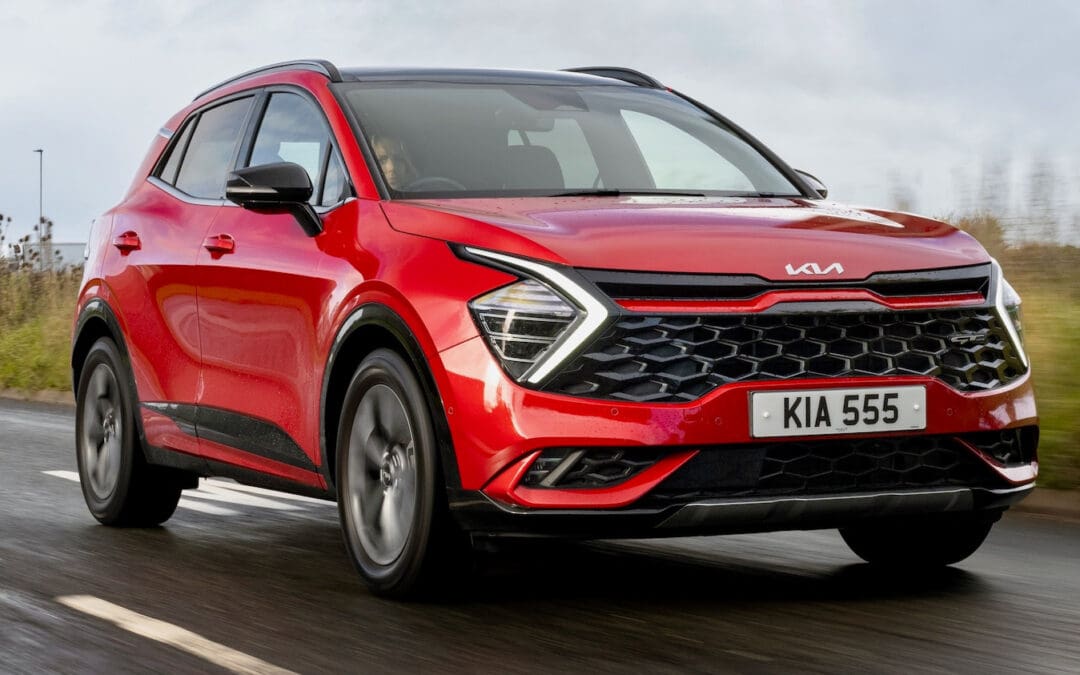Discounted business registrations meant Britain’s millionth battery electric car reached the road in January 2024, while the new car market grew 8.2% for the month, according to the Society of Motor Manufacturers and Traders.
The first month of the year saw 142,876 new cars registered led by the Kia Sportage (above), which repeated its success of January 2022, and an UK uplift of 10,882 units on January 2023, the best performance for the month since 2020 and the 18th consecutive month of growth. Welsh dealers enjoyed a 6.5% rise in registrations to 5,208 new cars last month compared to 12-months ago.
The increase was driven entirely by the fleet market, which rose by 29.9%, while private retail uptake fell -15.8%. Fleets accounted for more than six in 10 (63.2%) new cars registered, up from just over half (52.7%) last year.
The market also – narrowly – reached its anticipated milestone of a million BEV registrations since records began. Some 20,935 BEVs were registered in January, a rise of 21.0% year on year, taking the overall total since 2002 to 1,001,677 – testament to the commitment of manufacturers to deliver ever-increasing numbers of zero emission models.
BEV market share for January also grew year on year to 14.7%, although this is below the full 2023 performance of 16.5%. Plug-in hybrids recorded volume growth of 31.1% to take 8.4% of the market, while hybrid volumes fell -1.2% with a 13.1% share.
Volatility in BEV supply has been expected and is likely to continue as manufacturers adjust product allocation following the last-minute resolution over UK-EU rules of origin, which had threatened to apply tariffs to EVs, restricting affordability.
However, while fleet and business demand for BEVs grew by 41.7% in January, registrations by private buyers fell by -25.1% – an ongoing trend that will undermine Britain’s ability to deliver net zero.
The UK is now the only major market to combine a 2035 end of sale date with a mandated zero emission vehicle market share, but without any significant consumer incentives.
Yet it is increasingly clear that private buyers need more support to switch. Ahead of next month’s Budget, industry is calling for government to support consumers by temporarily halving VAT on new BEV purchases.
Such a step would cost the Treasury an average of just £1,125 per car, which is less than the cost of the previous Plug-in Car Grant and would put more than a quarter of a million electric – rather than petrol or diesel – cars on the road by the end of 2026, on top of those already expected. Not only would this cut CO2 by more than five million tonnes during that time3, it would mean that the next million EVs could be delivered in just two years.
Temporarily reducing VAT on EVs would partly mirror the tax exemption already offered to consumers on other carbon reduction technologies such as heat pumps. Supporting the EV consumer today would also ensure wider benefits such as increasing the supply of used EVs, enlarging the overall market to make it more attractive for charging and manufacturing investment, and slashing Britain’s carbon footprint.
RAC head of policy Simon Williams said, “Following a slower December for new battery-electric car registrations, it’s great that more than one million pure electric vehicles have now been registered from new.
“While this milestone proves there’s plenty of consumer appetite for plug-in vehicles, there’s increased pressure on manufacturers to make sure supply meets demand this year as 22% of all new cars sold must be zero-emission models.
“The Government must also play its part by stimulating demand at scale and making zero-emission driving more affordable. We urge the Chancellor, in March’s budget, to reintroduce a form of the plug-in car grant aimed at the cheaper end of the EV market and cut VAT on public chargers to match the 5% rate levied on domestic electricity. This would make charging significantly more affordable for those who can’t charge at home or those who regularly have to recharge on long journeys.”
Ralph Palmer of the environmental group Transport and Environment added, “Electric vehicles sales are showing a steady share of sales overall and have risen 21% compared to January last year, with one million battery electric vehicles now having been sold.
“Everyone expects the share of electric vehicles to grow through 2024 as the zero emissions vehicle mandate incentivises car makers to sell EVs and as supply problems settle down. However, the government needs to more to support private buyers to switch to EVs through providing better information about going electric and levelling up the provision of charge-points throughout the country.”
| UK best sellers January 2024 |
| Kia Sportage Ford Puma Nissan Qashqai MG HS BMW 1 Series MINI Audi A3 VW Golf Nissan Juke Hyundai Tucson |
Robin Roberts / Wheels Within Wales
Robin is the longest serving chairman of The Western Group. He's been vice chairman or chairman for over ten years and oversees the annual Western Group PR Driving Day each summer assisted by the group committee and supported by group members.
He contributes to a number of outlets in Wales and the UK, including the Driving Force editorial syndication agency feeding the biggest regional news and feature publishers in Britain.
Robin specialises in the Welsh automotive sector and motor related businesses with interests in Wales and publishes WheelsWithinWales.uk which covers news, features, trade and motor sport in Wales.

